#Constraints of Failure
Explore tagged Tumblr posts
Note
The pattern is that people straight up do not read™. or they read a 3-5 tweet summary of what happened and treat it as if they did. or because shonen expectations based on "the classics" is bullshit and significantly rotted people's brains when deciding wether an ending is good or not.
Which could be nothing right
yeahhh. i will forever regret reading the last chapter through leaks because it was a dreadful experience, and watching everyone ever shit on it for like a week after genuinely made me want to just get off the internet forever or something because i felt like an idiot for liking the ending (all this is my fault for getting too invested in both tumblr and mha etc etc).
All the "it's rushed" and pacing complaints barely matter to me at this point because you just cannot feel the pacing of something correctly when you're reading it exclusively through leaks. you can't absorb info like that. And don't get me started on the number of complaints and criticisms I've seen of the last chapter that are just provably bullshit (I saw someone say Izuku didn't get a statue lmao. yes he did, you just read the fucking leaks and watched twitter drama unfold instead of reading the actual chapter i fear).
#i just. do not think it is as bad as some people want to make it seem. i know not to take people who make cashier peaked in high school deku#jokes but like some of yall are treating this as if it's a major failure of the manga ? ? ?#it's underwhelming if you want#it didn't touch on stuff you wanted it to touch on whatever#i personally think that it did okay with the constraints it clearly had#like even without going into shonen jump conspiracy theories horikoshi had been doing 15 pages chapters for a while now#I also think that a lot of disappointment comes from fanon interpretations becoming canon in people's minds especially regarding izuku#and like do not get me wrong i had mixed feelings when i read the chapters i still have mixed feelings on some aspects (hawks what r you#doing etc etc)#i dont blame people who didn't like the ending for not liking the ending#i am just very annoyed by some justifications for not liking the ending#i don't even bother arguing with anyone at this point bc i don't want to be that person (too often) and because it just straight up makes m#feel bad lmao#anywayssssss i probably wanted to say something else but i forgor#oh no yeah listen. maybe you think it's lazy and maybe it is lazy to do an 8 years timeskip and leave a lot of stuff up to the reader#i personally really like this choice. important points were addressed and the rest can be speculated upon by the fanbase and by god.#we are the mha fandom guys. we can speculate. we love to speculate. we have EIGHT YEARS#you can do literally whatever you want man#i already have my personal canon for what happened during the eight years and believe me it helps a lot with the mixed feelings lmao#again. horikoshi did Not have a lot of space the story clearly had a lot of plot changes halfway through. i really do think this is more#than okay. this ending is not the end of the world i promise.#anyways i originally started like citing bs criticism i saw and then i thought ok lets not. inside thoughts etc etc.#i am not a meta analyzer i regularly learn i've misunderstood something about something or misremembered a plot point i am Not the person#for actually good meta and a lot of very insightful stuff on how we are very much not the target audience and lack cultural context go see#pikahlua lmao#mha manga spoilers#mha 430#mad mha ramblings//#ask//#i almost want to say ask to tag lmao? i have the mha cri/tical tag blocked so if anyone needs the opposite for me being overly positive
2 notes
·
View notes
Text
constantly thinking about how difficult it is to find actual discussions of mental health in tandem with creative work and how that's probably contributed somewhat to me thinking that my work is consistently garbage and wondering why i'm so behind my peers when the simple answer is less "you are inherently talentless" and more "actually learning and enjoying what you do is difficult when you're in a bad situation and struggle with undiagnosed neurodivergencies and depression on top of very low self esteem" and somehow the only avenue i've ever seen people talk about this from is through the lens of a neurotypical person who has never practiced introspection once in their life giving incredibly broad, surface level advice you'd tell a child
#maybe other people have had better luck but for me much like everything else it's been a case of#analyzing my situation and constructing methods to navigate it entirely on my own#and there's been so much fucking failure to do this along the way because i have to work around my own specific problems#and understand the way i'm dealing with them internally#and it feels like i've only very very recently figured out how to work within these constraints through all this trial and error#so i've only recently started feeling like i can actually enjoy art enough to where i can do it more consistently and actually improve#and even then there's an issue with standards-setting that basic advice doesn't work to fix#because all i can think about is how far behind all these issues have put me and i'm terrified i might never make up for all that time lost
2 notes
·
View notes
Text

there’s a special kind of grief you feel towards yourself when you’ve been mentally ill for as long as you remember. you see ppl saying they long to return to their old self but you don’t have an old self, or if there was, you can’t remember it. ur “old self” was a child. this self is all you’ve ever known. then there’s the fear that comes with trying to find out who you are without your mental illnesses, it’s all new to you and you don’t know if you’ll like who you’ll be
#it's... entirely too real#but... yeah...#the thing where you'll never 'be normal again' because you never were#and the shire can't be saved for anyone but especially not for you#I worry that this is going to read as deliberately unhealthy blackpilled doomerism shit#but also... it's important to me to be able to talk about mental illness as a chronic illness#because that's the reality for some of us#we can't count on not being mentally ill and postpone living our lives and trying to be happy until then#we have to find how to manage our illnesses and live the best life we can under the constraints that our illnesses impose upon us#which can be incredibly alienating when the predominant discourse around mental health (never mental illness lol) is about 'getting better'#in a complete and permanent way#I am very happy for people who experience depression or anxiety as an acute episode of illness that they eventually completely recover from#and get back to 'the old them'#but... that's never going to be me#and that's kinda sad#I'm so much better than I used to be but my best will always be compromised#and some people will always see that as a personal failure of mine#and my acceptance of being ill longterm with flare ups that are more severe occasionally as being defeatist and 'giving up'#bitch I try so hard#it's a full fucking time job managing my illnesses#and I'm still never going to do it well enough for you!#because you want a version of me who never has and never will exist except hypothetically!
27K notes
·
View notes
Text

Sometimes during the Classic Series, the production department was directed to do more with less money,
so the wardrobe department could put funds into the monster suits.
It didn’t show.
#Inspector Spacetime#Matte Shot (trope)#Matte Shot#Production Department#Wardrobe Department#What the Hell Wardrobe Department? (trope)#What the Hell Wardrobe Department#Budgetary Constraints#No Budget (trope)#No Budget#Classic Series#directed to use less money#make more with less#People In Rubber Suits (trope)#People In Rubber Suits#Special Effects Failure (trope)#Special Effects Failure
0 notes
Text
Writing tips for long fics that helped me that no one asked for.
1.) Don't actually delete content from your WIP unless it is minor editing - instead cut it and put it in a secondary document. If you're omitting paragraphs of content, dialog, a whole scene you might find a better place for it later and having it readily available can really save time. Sometimes your idea was fantastic, but it just wasn't in the right spot.
2.) Stuck with wording the action? Just write the dialog then revisit it later.
3.) Stuck on the whole scene? Skip it and write the next one.
4.) Write on literally any other color than a white background. It just works. (I use black)
5.) If you have a beta, while they are beta-ing have them read your fic out loud. Yes, I know a lot of betas/writers do not have the luxury of face-timing or have the opportunity to do this due to time constraints etc but reading your fic out loud can catch some very awkward phrasing that otherwise might be missed. If you don't have a beta, you read it out loud to yourself. Throw some passion into your dialog, you might find a better way to word it if it sounds stuffy or weird.
6.) The moment you have an idea, write it down. If you don't have paper or a pen, EMAIL it to yourself or put it in a draft etc etc. I have sent myself dozens of ideas while laying down before sleep that I 10/10 forgot the next morning but had emailed them to myself and got to implement them.
7.) Remember - hits/likes/kudos/comments are not reflective of the quality of your fic or your ability to write. Most people just don't comment - even if they say they do, they don't, even if they preach all day about commenting, they don't, even if they are a very popular blog that passionately reminds people to comment - they don't comment (I know this personally). Even if your fic brought tears to their eyes and it haunted them for weeks and they printed it out and sent it to their friends they just don't comment. You just have to accept it. That being said - comment on the fic you're reading now, just do it, if you're 'shy' and that's why you don't comment the more you comment the better you'll get at it. Just do it.
8.) Remove unrealistic daily word count goals from your routine. I've seen people stress 1500 - 2000 words a day and if they don't reach that they feel like a failure and they get discouraged. This is ridiculous. Write when you can, but remove absurd goals. My average is 500 words a day in combination with a 40 hour a week job and I have written over 200k words from 2022-2023.
9.) There are dozens of ways to do an outline from precise analytical deconstruction that goes scene by scene to the minimalist bullet point list - it doesn't matter which one you use just have some sort of direction. A partial outline is better than no outline.
10.) Write for yourself, not for others. Write the fic you know no one is going to read. Write the fic that sounds ridiculous. You will be so happy you put it out in the world and there will be people who will be glad it exists.
31K notes
·
View notes
Text
I think one of Imperialism's most evil strategies is the national scale torture you'll see inflicted on countries that dare to dream of freedom. Like it's not just about overthrowing the anti-imperialist regime itself, but utterly breaking the very social, economic and in turn psychological foundations it's built upon. Prolonged periods of destruction that are as systematic as they are sadistic with the aim of making life unlivable until the government either collapses or gives in, accepting whatever concessions are forced upon them as the nation is remoulded into an dependent and obedient little neocolony.
Sometimes an imperialist power will act directly to achieve this (just take the gratuitous and deliberate destruction of civil infrastructure during the bombings of Yugoslavia and Iraq), but the preferred strategy is to employ local proxies. Groups like RENAMO in Mozambique or the Contras of Nicaragua. Bands of reactionaries, traitors and general desperadoes are gathered up, trained, armed and transported over the border at the expense of the Imperialists and their local collaborators. These armed groups have no interest in build mass support, of representing an alternative way of life. Their only purpose is destruction; killing, torturing, looting, burning whatever they can in order to bring their country to its knees. Frequently targeting important nodes in the networks that sustain the nation and the people's faith in it (bridges, rail depots, factories, hospitals and schools) but ultimately happy to attack whatever they can; every house burned or person tortured contributes to the climate of terror and corrosion of government credibility. Because when they kill these groups don't like to do it cleanly; their attacks generate countless reports immolation, disembowelment, victims hacked to pieces and left to bleed. But when possible they prefer to leave their victims alive and capable of further spreading their terror, inflicting the most vicious sorts of rape and mutilation on a mass scale
It's not just just evil for the sake of evil mind you. The cruelty has a point; human destruction to accompany the physical. Every person killed is someone who can no longer contribute to the development of the nation, while even living yet physically and psychologically broken victim places further strain on their country's increasingly fragile support systems. Meanwhile the terror of these actions spreads the impact beyond their immediate victims. The murder and torture of peasants makes the survivors too scared to go back into their fields, slowly starving the nation as the rural economy grind to a halt. The gruesome deaths of traders and travelers leaves the survivors too terrified to continue their business, shutting down the distributive networks that make national development and often life itself possible. The terror unleashed on foreign professionals can prompt the survivors to flee and discourage newcomers from arriving, depriving the underdeveloped economic and education systems of the skilled workers they need to improve or even function. And every broken body, ever broken mind, is proof of the government's weakness and ineptitude; a humiliating failure to protect their own people that demoralises supporters and empowers dissenters. The motivated sadism of these terrorist attacks is a microcosm of the motivated sadism displayed by their Imperialist backers
But why go to all this trouble? Why not just send in the paratroopers or organise a coup to end those troublesome regimes quickly? Sometimes it's a matter of possibility. As great as they are, the powers of Imperialist nations are not unlimited. All manner of constraints (domestic unrest, international condemnation which advantages dangerous rivals, the simple financial and human costs of such operations) limit what actions are viable or desirable. This is especially significant when the targets are motivated and disciplined anti-imperialists with a base of deep-rooted popular support, the sort of regime that won't go down to a simple commando raid or bribe to the right general. But sometimes, it's not enough to merely cut down a dissenting government; you have to salt the earth and make sure nothing similar ever grows back. I'll finish with the words of an anonymous Jesuit priest, talking about Nicaragua yet in terms widely relevant enough to be published in John Saul's conclusion to A Difficult Road: The Transition to Socialism in Mozambique (1985):
In Chile the Americans made a mistake. They cut off the revolution too abruptly. They killed the revolution but, as we can see from recent developments there, they didn't kill the dream. In Nicaragua, they're trying to kill the dream
793 notes
·
View notes
Text
God I love animation. I love it for the way it can bring anything to life beyond the constraints of boring ol' reality, but also the ways that it's inextricably linked to, and draws on the conventions of live-action film-making.
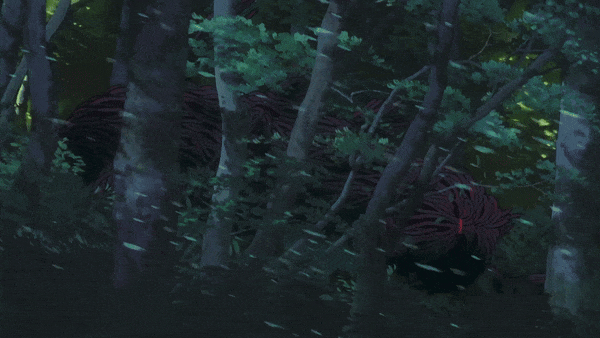
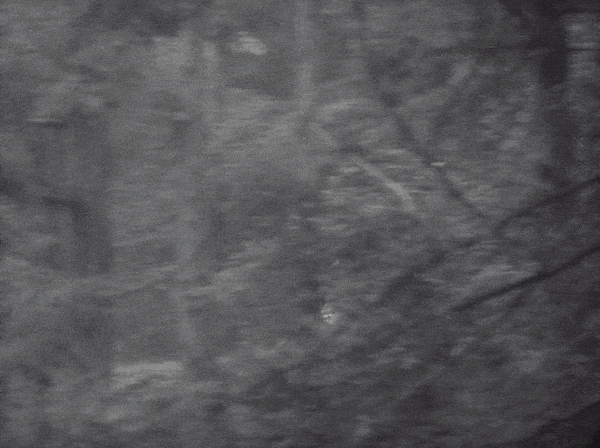
So fuck it, let's look at how Hayao Miyazaki straight up copies some camera framing techniques from his predecessor and the other most influential Japanese filmmaker of all time, Akira Kurosawa! (Kurosawa really was the master of framing scenes around his characters, so he's a great source of inspiration)
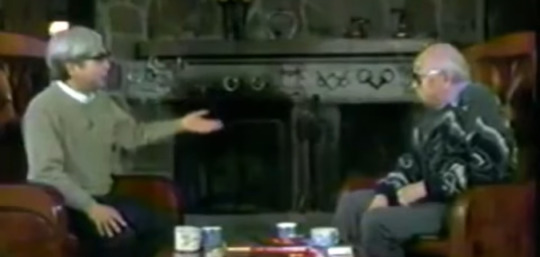
(btw, this is a screenshot from this TV special where the two met for the first time just after the release of Kurosawa's final film. It's pretty interesting, and also very cute how nervous Miyazaki seems to be to meet one of his idols.)
Specifically, how the two each choose to break the 180 degree rule (well, not technically 'break' in the case of Kurosawa) to show their protagonists' changing destiny in "Throne of Blood" and "Princess Mononoke".
For anyone who doesn't know, the 180 degree rule is a basic film-making rule of thumb which states that in any scene where two characters interact, you should draw an imaginary line between them and the camera should always stay on one side of that line.

("In the Mood for Love" - Wong Kar-wai)
This way, one character is always looking to the right of the camera, the other is always looking to the left, and the audience doesn't get confused by the geography of the scene. Crossing this line can be disorienting, but when done intentionally, it can convey a paradigm shift of some kind in the scene.
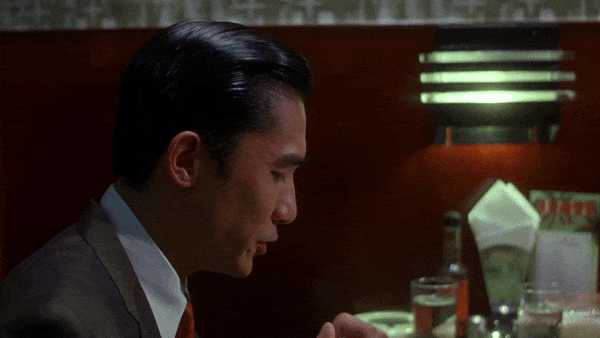
In this scene from "Throne of Blood," (a feudal Japanese retelling of Macbeth) Washizu's wife Asaji discusses tactics with him and tries to convince him to aspire to the throne and to assassinate his lord Tsuzuki while he sleeps.
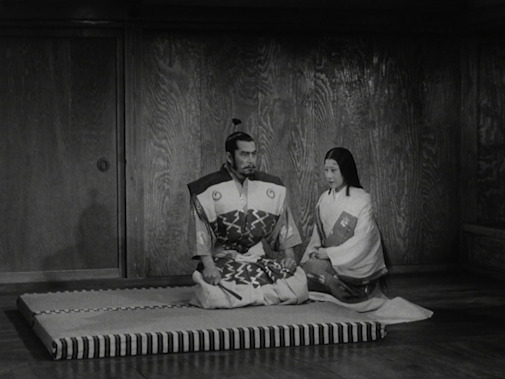
As two servants appear to notify them that Washizu's sleeping quarters are prepared, the camera dollies left and around the characters' backs. This camera movement is motivated by the motion of the servants' torches outside the room, but it also signifies a change in Washizu's outlook.
Washizu is completely silent for most of this scene, contemplating his wife's advice. But as the camera slides behind his back and across the line of action, the scene is now re-framed, illustrating his change in perspective.
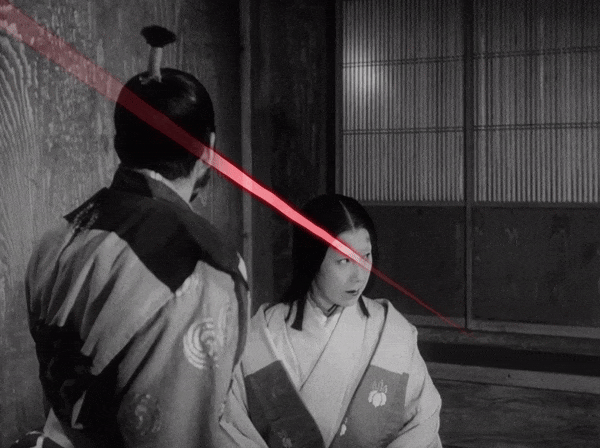
He's been convinced and the trajectory of his life is about to change - and now, facing away from the camera, is the time for action.
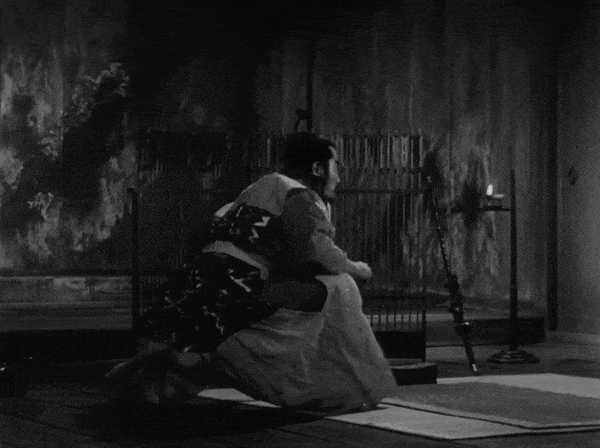
Because the camera slides smoothly across the line, Kurosawa isn't technically breaking the 180 degree rule. Miyazaki on the other hand, takes it a little further.
The complimentary scene in Princess Mononoke comes near the start when the wise woman of the village reads Prince Ashitaka's fortune after he's cursed by the wild boar spirit. She tells him that it is his fate to leave the village and travel to the west, where he may be able to lift the curse on his arm. The trajectory of Ashitaka's life changes in this moment too. As he accepts his fate, the change is symbolized by him cutting off his hair, but also by the camera jumping the line.
Throughout this dialogue scene and even as he cuts his hair, the simulated camera sits just slightly to the side of Ashitaka's left shoulder.
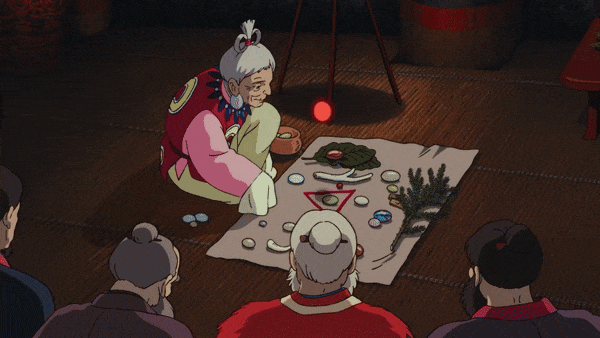
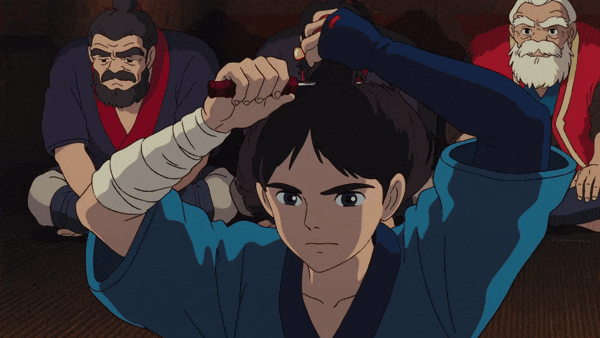
But once it's done, for the final shot, the scene is reframed and we jump to the other side, where Ashitaka is now looking to the right of the camera instead of the left.
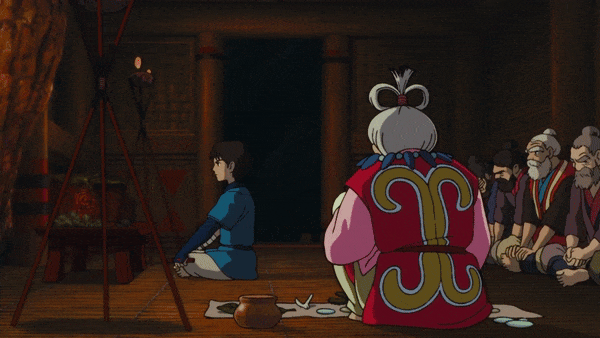
Making the camera dolly across a scene like Kurosawa's version in 2D animation is no simple task, so this transition with a simple cut is in a way subtler, in another way a bit more jarring, but it conveys the same meaning.
This is the moment when our protagonists make the choice to embark on a new destiny and re-frame their lives.
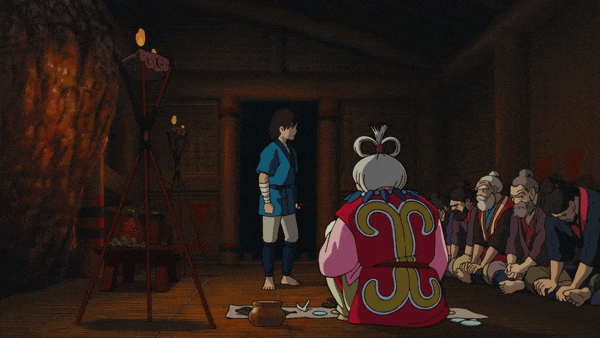
This has been an excerpt from a short video essay I made a while back, which not many people watched. I think this is at least in part due to my failure to package it well, and it seems you tumblheads like this animation/cinematography analysis stuff, so this is an experiment to see if, with the help of y'all, and a new title and thumbnail, it's at all possible to give this video a second wind in the eyes of the Youtube Gods!
So if you found this interesting, I'd appreciate if you checked it out! Thanks for reading!
youtube
#Also i spent a lot of time on the little animated bit at the start so please watch it lol#animation analysis#mini essay#video#video essay#princess mononoke#throne of blood#hayao miyazaki#akira kurosawa#Youtube#gif warning
1K notes
·
View notes
Text
REVIEW
Gatsby: An American Myth (Welch, Chavkin, Bartlett, Majok, & Tayeh; American Repertory Theater)
Something that most adaptations of Gatsby get wrong, whether film or stage, is the treatment of characters as archetypes rather than individuals. Symbolism drowns out most genuine attempts at capturing emotional connections and conflicts of personality. They forget that this story is not only a failure of the so-called American Dream; first and foremost, it’s a tragedy of failed roles and relationships. Almost every one of the players is attempting to be someone they are not, and even as they reach for what they believe they should want, they reveal with increasing fervor what they actually want. This is the heart of what makes Welch’s new adaptation so devastatingly, disarmingly unique, so true to its source.
The set design is literal wreckage. Crushed and warped automobile chassis scaffold the moving staircases, and concealed trap doors. The backdrop shows no clear incorporation of the infamous Eckleburg billboard; rather, it is made up of a dotted grid resembling headlights. These play out effects ranging from a downpour to camera flashes to, briefly and only once, a pair of eyes that make no effort to hide behind the owlish frames of glasses. The only thing infusing this jagged framework with meaning is the people who move through it.
The lighting design works with the set’s incongruences, deepening or excavating shadows as needed. The brightness, when it flares, is blinding. Jewel tones either enhance or diminish a costuming scheme that is composed of either very pale or very dark shades, no in between. And whether it’s the post-apocalyptic black and gray cabaret garb of the ensemble or the wealthy protagonists’ pale suits or the gunmetal and gray denizens of the wasteland, everyone’s trouser and skirt hems are conspicuously rimed with reddish dust. The visual effects are nearly impossible to describe without sounding like I had some kind of desperate fever dream.
So far, I realize that these descriptions of the set and lighting design sound like this production is about to fall into the trap of overplaying symbolism, but please bear with me. With all of that established, I can focus on what’s truly extraordinary here, what’s meant to and does shine unhindered. The acting, musicianship and vocals are all so precise that it was hard for me to believe this show is still in previews. It feels Broadway ready, West End ready, major international tours ready. If I was the production crew, I’d turn this loose on a massive scale from the get-go without a second thought.
Much like with Hadestown, the musicians are not down in an orchestra pit. They’re characters in their own right, present on the stage from start to finish on tiered risers that run up from the center on each side from one of the catwalks. I’m sure Chavkin’s involvement as director has everything to do with why this show feels so much like, moves so much like Hadestown. The company is on an equally small scale, about 23 - 25 people including the principals.
Costuming among the ensemble is delightfully gender agnostic. I mention a cabaret aesthetic earlier in this review, and I’m not kidding. If you had shown me the ensemble costume designs without showing me the principals’ designs, I would have assumed I was looking at a Cabaret revival. They’re the most talented dancers I’ve seen occupy one stage in more than a decade. The choreography relies on movements in eerie unison for a significant portion of the show, but not without allowance for individual flair within those constraints. The guy sitting next to me, when I spoke to him at the intermission, said he works as a choreographer in regional theater, and he’d never seen anything like this. I couldn’t agree more; the dancing is singular, and as impressive as the musicianship is, the dancing and unusual body movement are maybe the greatest achievements of this show on the living, breathing end of things. I could have watched the dancers for those three hours without any dialogue or vocal intervention and still understood the story. That takes so much fucking doing.
As for the principal cast, they’re constantly among the ensemble; when I say these are all triple threats in the purest sense of that terminology, I really mean it. You always expect a few of the principals to be less dance and movement focused, more polished on the acting and singing side, but this show gives you terrifying proficiency from every angle. Even the guy playing Meyer Wolfsheim is at the center of what I think is the most memorable dance number in the piece. I’ve just never seen such versatile principals all in one production. What’s even more extraordinary is that I had never heard of or previously seen any of them, and that takes some doing given how much live theater I’ve consumed in several decades of life.
Ironically, the musical composition is the one aspect of this production on which I’ll be spending the least time. I need not tell you why Welch and Bartlett were perfect for this job. They understood the assignment, and then some. There’s not a single weak number among the track listings, and I desperately hope they release a recording soon. The standout numbers all have something in common: they showcase Soleia Pfeiffer as Myrtle Wilson. You can tell that’s the role where Welch sank most of the sound that’s considered her signature style. I don’t even need to describe it; you already know what I’m talking about. What’s impressive otherwise is the restraint, the lack of over-reliance on that signature style.
The principals are fucking perfect. I’ve kept this review tautly professional without meaning to thus far, but from here on out is where I start bleeding feels all over the post. If you don’t already know who my blorbos are due to my writing history with a Gatsby-related novel (The Pursued and the Pursuing, 2021), you’re going to know by the time you’re done reading this. You’re going to know exactly who I love and why, who I hate and why, who I ship and why. But you’ll also know that I approach all three of those elements from a place of enjoying every moment of those characters, even the ones I hate. Nobody’s performance put me off or struck the wrong tone when taken in context of the novel and how the tragedy of how their relationships play out.
For a long time, I’ve been saying that there are certain support roles, certain sidekicks, that make or break the higher-profile person to whose side they’re stuck, ride or die, until the bitter end. Horatio is a great example that I’ve ranted about before; if your Hamlet production has a lackluster Horatio, then it doesn’t matter how good the Hamlet is. You have nothing if you don’t have the binary star system at the heart of that harrowing universe. I’ve seen other adaptations of Gatsby consistently fall apart because Nick Carraway is treated like the kind of voyeur who doesn’t matter, the kind of voyeur who serves as the audience’s eyes and ears, and nothing else. Anyway, this is all to say: Ben Levi Ross as Nick might be the most compelling argument I can make for the fact that the creative team behind this show understood the assignment. He’s awkward, warm, sincere, and reactive in all of the ways you need Nick to be. He’s not a passive observer; he’s in the middle of everything, and he knows it. There’s a self-deprecating response he makes when one character, Jordan if I’m not mistaken, quips that maybe he’s the reason for Gatsby’s parties for all he knows. “Maybe I am,” he says, and the tongue-in-cheekness belies a gutting meta-sincerity. We believe Daisy is the point, Gatsby believes Daisy is the point, but what’s borne out every breathtaking moment of this production is that Nick is the point. He always was. He’s also given his due as a gay man in context of the story for the first time ever. I might make some folks mad when I say Nick has always been gay; I’m going to point you to Myrtle’s apartment party and the hookup with Mr. McKee as textual evidence in the novel. The kiss with McKee, the hookup with McKee, is unapologetically here. His lack of belonging everywhere else he’s ever been, because he is gay, is unapologetically here. One of the most memorable numbers in the show hinges on the hope feels at being able to be himself in New York. Queer fans of Gatsby have been waiting a long time for this. Anyone who’s read the text closely and understood him has been waiting a long time for this. I’ve been waiting several decades as a reader, and I would’ve waited forever to have Nick so fully, lovingly realized.
One of the other things that Gatsby adaptations have persistently gotten wrong is the titular character himself. The invention of Jay Gatsby hides the underlying James Gatz, makes it feel as if that old self is truly subsumed, as if it never mattered. But Isaac Powell gives us a Jay who’s exactly as he should be, who can’t hide beneath his own attempt at artifice and reinvention worth a goddamn. He’s young (as young as Nick; they’re 32 and 30 respectively both in the novel and here), painfully earnest, and just barely keeping a handle on the criminal shit he’s had to do in order to get where he is. When he says old sport to Nick, it’s not an affectation; when he says it to Tom, it becomes a biting insult. This is a Jay who knows where and why he’s vulnerable; he latches onto Nick like a not because he sees a man close to Daisy that he can exploit, but because he sees another young man who’s equally vulnerable, equally an outsider, equally haunted by the things they had to do in the war. From the moment they meet, they are almost always touching—a hand on the shoulder, on the back, getting in social harm’s way for each other, eyes seeking each other without cease in the most crowded of settings. When Jay takes Nick to lunch to meet Wolfsheim (who has in this production taken on the function of Dan Cody as well), it’s not to have somebody else vouch for the artifice of who Jay Gatsby is. It’s taking Nick to meet his fucking father-figure, and all of the messy, sincere “if you hurt my boy, I’ll kill you” sentiment that Wolfsheim aims at Nick was the moment I knew just how much the Nick’s loss by the end was going to hurt. Jay’s love for Daisy is a ghost of itself, even if as painfully earnest as everything else about him. Meanwhile, his attachment to Nick is so disarmingly genuine from the start that you understand the true tragedy you’re about to watch untold: these men who need each other, maybe even were made for each other, each prove unable to step outside their parallel distractions from what they truly are to each other. Jay’s interactions with Daisy and Nick’s interactions with several male and/or gender ambiguous members of the ensemble have something in common, which is a shocking level of physicality. This show had an intimacy coordinator; that’s the level of no holds barred we’re talking about. When you look at Tom and Myrtle, you can see why that was merited, too.
Speaking of Tom (Cory Jeacoma), the treatment of him here is every bit as scary as it should be. There’s no attempt to make him palatable, unlike what I’ve seen done with him in other adaptations. He towers over everyone else in the cast, I mean everyone, to a physical degree that’s uncomfortable. The way his wife, lover, and friends all flinch when he gets too close to them speaks volumes to the fact that he’s an abuser in every sense of the term. Even Nick, the prodigal college friend from Yale, is on eggshells around him (which, by the hotel blowup at the end of the show, becomes a sneering, reckless contempt, one of the driving forces that drives Nick to put himself between Jay and Tom whenever real harm is on the table). At the same time, this is a Tom who sincerely loves his wife and was only ever using Myrtle as a fling. You can tell he never meant any of the promises he made Myrtle. When Daisy tells him she didn’t stop the car on purpose, it’s as if his wife’s unapologetic act of manslaughter (“It was her or me!”) is the thing that wins him back. They aren’t careless people; they are people who consciously choose, day in and day out, to use others until they’re bored or done with them. The ruthlessness of Tom and Daisy as a couple is impressive, played up to a level that I feel more adaptations should do without fear of exaggerating the text.
As mentioned above, Daisy (Charlotte MacInnes) is no delicate, nervous creature who can’t help her actions under duress. She knows what she’s doing every bit as much as Tom knows what he’s doing. They use people, hurt people because they get bored and restless and enjoy it. I respect a Daisy who’s in control of her actions every step of the way even if I don’t like her; it’s better than trying to depict her as weak and at the mercy of the men around her. She’s a pragmatist and a survivor. So many of her songs are about choices and being conscious of those choices. She is a person you should fear every bit as much as you fear her husband, and even Jordan knows she’s not safe in Daisy’s orbit.
As Jordan, Eleri Ward is one of the neatest personalities on stage. Like Tom, she’s noticeably taller than most, which gives her a commanding physical presence. She has no romantic interest in anyone; I fucking love that this production show her and Nick bonding on the basis of being queer and tired of everyone else’s shit. This is a more likable, relatable Jordan than I’ve seen in the past. This is a Jordan whose relationship to Gatsby is much more familiar and warm, much more akin to the friendship she forms with Nick. In fact, the queer-and-tired vibes that roll off several of the principals in this production are palpable.
Myrtle and Wilson (Matthew Amira) aren’t always played as effective foils for Daisy and Tom, but here? They unquestionably are. They do actually love each other in spite of the things they’ve done to hurt each other, and it’s a constant dance of daring each other, challenging each other. The most memorable duet in the entire show is between them, during Act II. The confrontation is positively electric. These are two people with deep, complicated history. Of all the couples in the show, they feel the most real, the most alive. It makes the loss of Myrtle so much more wrenching; she’s not just a plot device emblematic of the bad choices they’ve all been making. She’s not shallow or frivolous or anything like that. She’s a shrewd woman with complex motivations, and for the first time ever I find myself loving her and caring what happens to her. She’s thrust even further into the action in that one of her part time gigs is working as a maid at Gatsby’s parties, a conceit that works shockingly well and hastens the devastating consequences of her affair with Tom.
I’ve made mention of Meyer Wolfsheim’s (Adam Grupper) uniquely enhanced role previously, so I’d be remiss if I didn’t comment on him again. This is a man who does, in fact, seem to give a shit about Jay above and beyond using him as a tool in his criminal empire. It’s not necessarily a healthy father-son dynamic, but Wolfsheim is usually played as ruthless, opportunistic, inhumanly calculating. Here, he’s a charming, but unquestionably dangerous man moved by a young soldier’s plight. He seems conflicted between his love for Jay and his need to have Jay continue to hold the party line within their business relationship. Wolfsheim is deeply conflicted about Jay in a way that I haven’t seen any Wolfsheim be played previously. And, as I mentioned earlier, the actor has a showstopper of a song and dance number. That may be the #1 “I wasn’t expecting that, but I’ll take it!” moment for me in this show. And I say “may be” only because the moment that truly stopped my heart, will stay with me until everything else fades from memory, is perhaps only understandable in the context of my engagement with the text of Gatsby as a writer of transformative works.
Daisy’s and Tom’s daughter, Pam Buchanan doesn’t always appear in adaptations because she’s a toddler. Even in the novel, she a throwaway mention plus a single scene near the end where the nanny brings her out to meet Jay and Nick. She’s most often left as a throwaway mention without even grave of the scene where she appears. The scene in the novel, however brief, is memorable—and has been captured in all its fragile beauty for the first time in this adaptation. Jay and Nick both pay bewildered, wondering attention to this kid when she’s brought out. Jay drops to his knees and takes her hand when she greets him while Nick looks on in a moment of singular focus on both of them. The child who plays Pam here has a spark, an expressiveness that made me choke up even though she’s only on stage for a few minutes, if that. The tableau is one in which you can feel the shock of reality, however brief, touch on these men—Daisy’s and Tom’s reckless actions may yet do harm to someone who’s barely even begun to live her life, but who is just conscious enough to be a participant in it. They recognize that they, like this child, are probably in for a word of ruin—and that they have let it go on for so long that there’s now nothing they can do about it. For me, the deepest tragedy was watching Nick and Jay throw off that moment of heartbroken, horrified recognition prompted by Pam and return to the parts they’d decided to play out until the moment one of their hearts stopped.
Speaking of grief, of Nick’s grief since he’s the one who loses so much: there is only one person who loses more, and that’s Mr. Gatz, Jay’s father. They preserve his arrival at the house when Nick is the only person who stays around to carry out Jay’s funeral and burial. And when he arrives, the visceral shock of seeing his dark skin, braids, and beaded elements of Native regalia in juxtaposition with his otherwise period-typical Western garb underscore the tragedy of what young Jay was running away from, of what he never quite succeeded in erasing from himself. The burial scene shows Nick reverently bringing several of Jay’s folded shirts from the house and handing them down into the grave to Mr. Gatz, who places them reverently as possessions to accompany his son into thereafter. The cultural ramifications are all at once understated and devastating. Nick has moments with each of Jay’s father figures that are among the most complex and moving in the show. The program does not make clear the name of the ensemble member who takes on this most memorable of all Mr. Gatz appearances, and this erasure in and of itself is both unfortunate and telling. This is a world that never belonged to the majority of those who inhabit it, and Nick realizes it with heartbroken clarity after having this final interaction. Even though he’s an outsider, he’s part of a world that has erased and betrayed the man he loved so much at every turn.
The closing number, “We Beat On,” felt like it needed something more, but it utilized the final line of the novel to a deeply moving effect. The lights go down suddenly as the last word is sung; it feels like the song is half finished. When the lights came up, Nick and Jay were center stage in each other’s embrace, just withdrawing from each other as the entire company transitioned into final bows. That’s how I’ll remember them, always: touching even when they’ve already lost each other, borne ceaselessly back into each other’s arms. If Nick is Orpheus, then I have no doubt that he, too, will tell this story again and again until someday, somewhere, something gives.
596 notes
·
View notes
Text
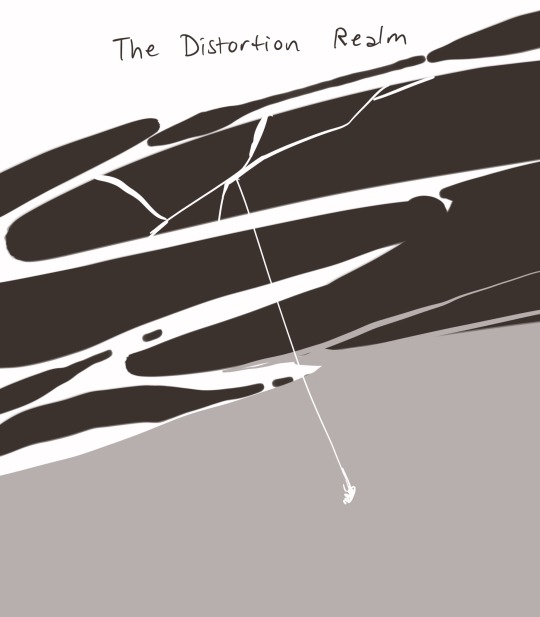
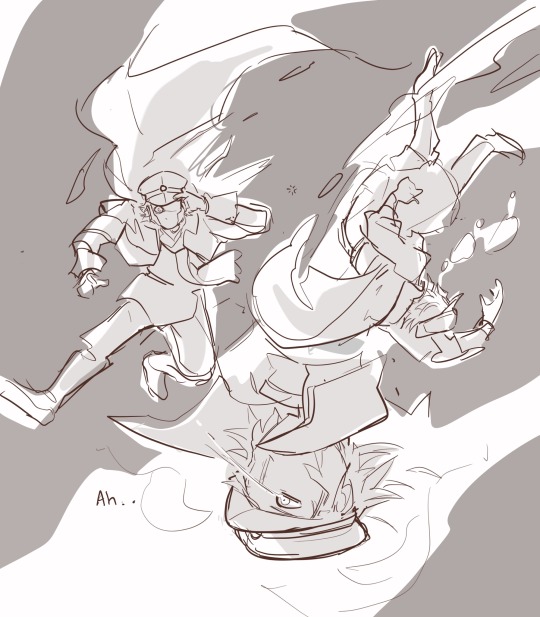
Elesa climbs to celestial tower to ring the bell. Emmet, stuck in between the distortion world, finds his way home.
Part 1/ Part 2
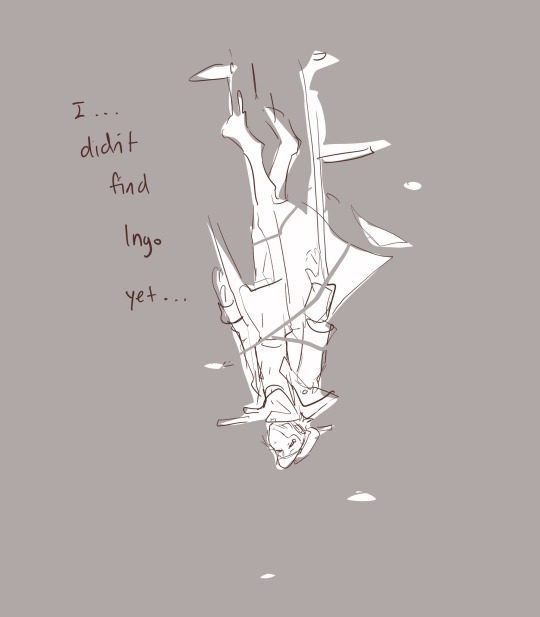
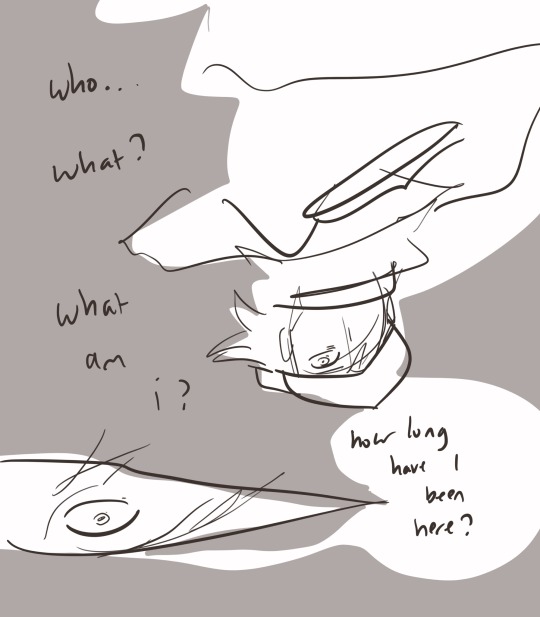
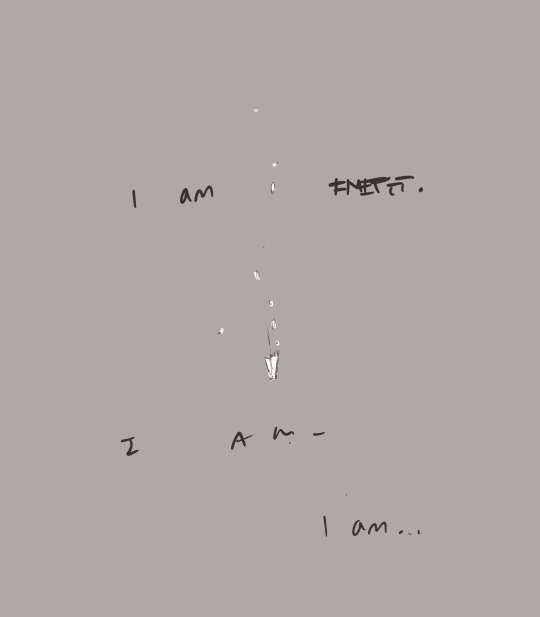
The conductor falls, down, down, down.
“What’s my name?” He calls to the abyss in terror (what is terror?)
He’s a singular being, right? (That’s not right. He’s one of a pair.)
The abyss gazes back. It has no answers to give, in its multitude.
Not to someone that’s so, so alone.
———
Somewhere else, one Elesa of Nimbasa rings the Celestial Tower’s Bell, over and over. Her companion, Chandelure, keeps watch.
Nothing happens.
Elesa’s stomach sinks. The reverberations of Celestial Tower’s brass bell mocks her in its echo. The vibrations of it’s distortion only makes the tears she tries to hold at bay worse.
In the blur of her failure, she sees chandelure’s flames suddenly die. Part of her panics.
The rest of her is apathetic and numb.
What’s the point? It didn’t work. Elesa closes her eyes. Tries to swallow, and fails. She’s so tired. She’s so, so tired. The deal with Azelf, the media storm she’s weathered, the constraints of her job, the almost loss of chandelure-
Emmet has been gone for three months. Ingo has been gone even longer.
They have gone where she can’t follow.
Elesa, the ghost whispers in her head. Elesa shakes her head in denial. She doesn’t want to plan right now. She wants to curl into herself, and disappear, just for a bit.
Elesa!
“I can’t do this,” she croaks. The sob in the back of her throat bubbles outwards. She wants Zebrstika. She wants Skyla. She wants her friends.
The paliphet Azelf forced her forward. It permeates her thoughts, drowning out logical thought.
(Too much willpower, and it will become an obsession, Azelf had warned her once in Ingo’s voice. And then, in Emmet’s voice: And when you fail, it willll break you. And finally, in her own voice: you will not have a choice but to move forward, with this curse.
I accept, elesa and told it back in the lake.)
I’m so tired, Elesa thinks now, two months later.
But she keeps moving forward. The bell rings again as Elesa strikes it, with all the hurt and rage and longing forced by her own hand into her soul-
-And that’s when chandelure screams, and there is a terrible rolling crack, and Elesa feels the sudden lurch in her gut as she looks up, her apathy torn into shreds as-
The sky tears open in a fractal wave.
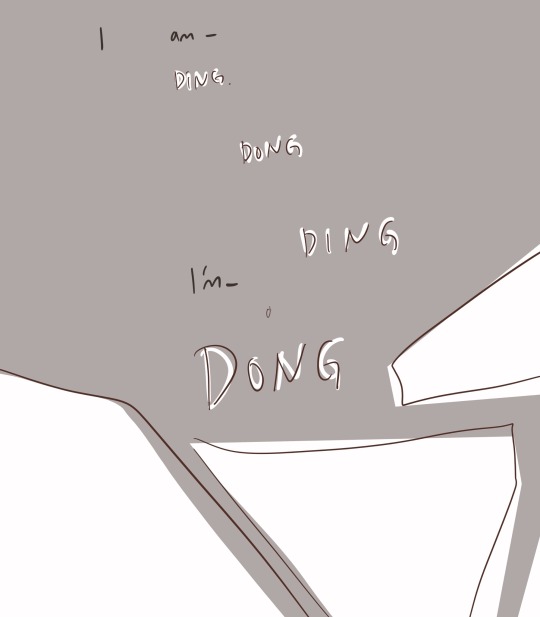
Elesa gapes.
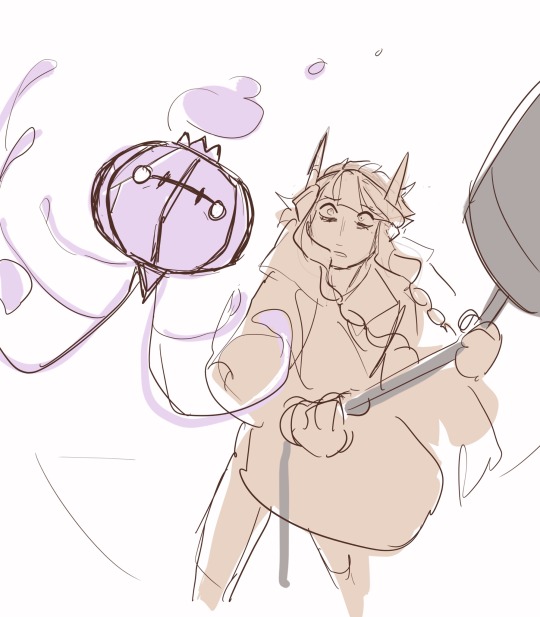
She can not comprehend the sudden black webbing across the sky. In the distance, sirens suddenly start wailing as people stop to perceive the impossible.
But Elesa does not care, because in that moment, the wrench in her gut is so great she almost staggers off the platform. Chandelure is by her side in an instant, her glass body a warm comfort to the sudden chill, because-
Something white is falling.
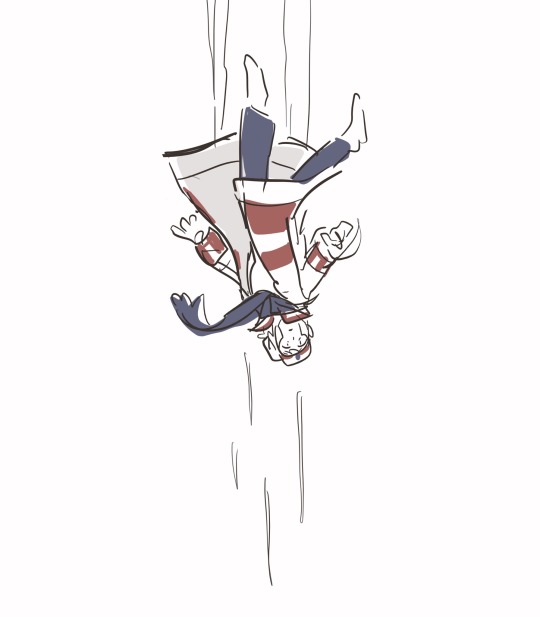
Elesa’s doesn’t know what she yells. But the tug in her chest feels like the beat of a drum, and she is helpless to the melody that calls for action.
Azelf’s blessed takes a leaping step forward, off the building. Chandelure lets out a panicked chime and the warmth of psychic cradles Elesa as she reaches out, arms outstretched, falling and flying and-
And Emmet, sparking with white electricity, reaches back.
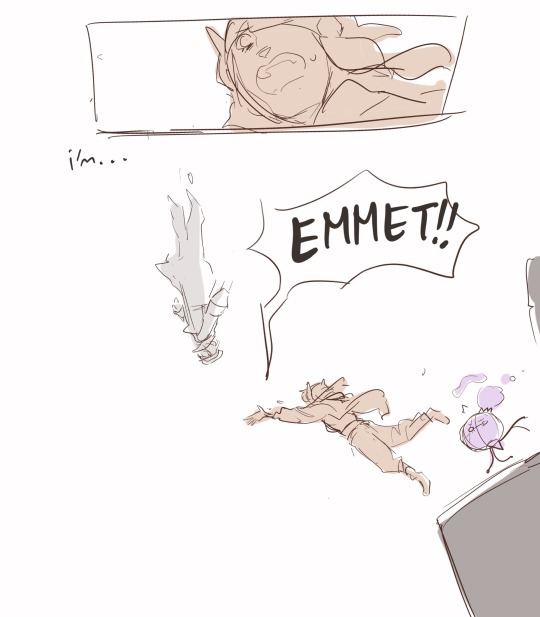
NOTES:
AU’s Salvaging the Ship of Theseus! Everybody has a Bad Time. (Emmet and Eelektross go to Hisui and learn about the joys of the distortion world. Elesa hunts legends and makes bad deals. Ingo babysits some sneaslets.)
Backstory and explanation:
Prior this scene, Emmet was travelling Hisui with Eelektross before he falls through a mirror and becomes lost in the distortion world for a month. Elesa and Chandelure, meanwhile, refuse to give up on their remaining friend. (Ingo’s fine! He’s in Hisui right now trying to get fired so he can go searching for his memories. Eelektross is… less fine. We will Worry about That Later.)
Disclaimers: Everything’s a work in progress and subject to change!
Part 2!
#submas#submas au#salvaging the ship of theseus#(gives you a drabble)#this fucking scene…. living in my head… HARASSING ME UNTIL I WRITE AND DRAW IT.#BEGONE FOUL DEMONS#emmet#elesa#chandelure#pokemon#pokemon au#hope this haunts you as much as it haunts me#critdraws#critterbitter screams into the void#submas angst#submas fanfiction#fanfic#Spotify
635 notes
·
View notes
Note
Given that MC and Shea have known each other for six years, Shea probably has a pretty good idea of MC's personality. I'm playing an MC who has a tendency to be kind, selfless, and compliant, and certainly Shea would notice this. Shea would also know that MC killed their previous Keeper. How much does each of these play into their perception of the MC? Do they see it as the previous Keeper's failure to keep MC under control? Do they think the MC is trying to be on their best behavior because they've already messed up? Does Shea have any lingering doubts or fears about MC hiding their actual intentions? Do they think the ritual or their experience with the previous Keeper, or even with Shea themselves, played a part in changing them, or do they think this is always how the MC was?
Shea has a sort of... unwavering faith—or loyalty perhaps?—towards the main character. This is regardless whether you've chosen a friendly, indifferent, or hostile relationship with them. Shea does not blame the MC for killing their previous Keeper, at all, and feels it was very much justifiable.
Shea does believe that the helvling's imprisonment and subsequent torture and just general maltreatment at the hands of the Order and Keeper Eckhart has profoundly changed them, marking them beyond their scars and tattoos, and that's not even taking into account the whole amnesia thing. Anyone would emerge nearly unrecognisable from a traumatising ordeal like that.
Shea also does not believe that the MC is hiding their true intentions or anything like that—they just see someone who, despite everything, has managed to survive, who has done whatever necessary to keep going. They respect that, immensely.
In their role as the helvling's Keeper, they've tried to mitigate whatever damage they could (whether it be emotional, physical, or mental), but they're still bound by the Order's constraints, as well; Shea cannot refuse their orders.
#Shea would've gone back and killed Eckhart for the MC if they could#that's how much they loathed him#asks
143 notes
·
View notes
Note
https://www.wired.com/story/therapy-broken-mental-health-challenges/
I came across this (old) article and it made me think of what you shared about your therapy experience. Would you say your therapy experience worked? It almost feels like you were telling us about how you were A/B testing your way through it.
Yeah, I remember reading that article at some point either before therapy or early on. I don't remember what I thought overall but I do remember being astonished that people expected therapy to help them in six sessions, and that most people report improvement in only 15-20. Not because I think either of those things are unrealistic based on any kind of evidence, but because that's not the expectation I was ever handed when I was in therapy. I was in therapy for nine years as a kid, until I turned eighteen and could legally refuse to go. Not for anything I did, like it wasn't a court order, I was simply put into therapy and wasn't allowed to leave by the adults in my life.
The thing is, because it was mandatory, because at least one of those therapists broke ethical constraints, and because across nine years and three separate therapists nobody caught my ADHD, I have a more complicated relationship to therapy than a lot of people. I still catch myself thinking of things I can't tell my therapist because then she'll have leverage on me. Which is absurd, but it took me a long time to start saying those things to her. I am difficult and private and smart enough to make that a real problem, so it's been a slow process for me.
I also think that article is complicated, because it makes a lot of good points but it also seems at times to confuse therapy itself with the abusive nature of the American healthcare system. So while it's a useful article particularly when it speaks to marginalized peoples' experiences, it may discourage people who could benefit from therapy from doing the work to find a therapist. It's a good article to learn from, but I wouldn't advise people to decide for or against therapy based on it.
(My thoughts on my own therapy under the cut)
I'm still in therapy. It's difficult to measure results. I think I handle interpersonal stress better than I used to, but I haven't been able to find much to help with some of the emotional volatility I experience, and while I've set some good boundaries with family, the process of doing that was and continues to be stressful and upsetting, in some ways harder than simply not having them, so I'm still assessing that. Part of the problem for me is that I don't find cognitive-behavioral therapy useful for what I need, and while I understand there are differences, like 90% of all therapeutic systems boil back down to those techniques. Reality checking, visualizing, physical stimulus responses, mindfulness, as I said once to Therapist, "It's CBT all the way down." I don't respond to many of them and others I was already doing, so *shrug emoji*
At that point, when I realized there was no system that was going to help with my specific problems -- in part because the problems are ADHD related in a way that you can't train your way out of -- we also agreed it was time to try medication. Which felt like a failure, but I know that realistically I looked at the situation as it is, assessed my options, and made an appropriate choice, which is after all what therapy is often about.
So I've been on Clonidine for a couple of weeks. And it's doing fuck-all so far, but it's the lowest dose and there are other options too, so it's an ongoing process.
Outside of frustration with trying to fix problems that I honestly don't think anything but medication will fix, therapy's ok. If nothing else the expectation of it helps me identify actual problems in my life. And like most people I enjoy talking about myself but I also have a lot of struggle around asking for that kind of indulgence from friends, so doing that for an hour in a structured transactional kind of way is easier for me.
Ultimately, there's no real one-size solution that's called "Therapy", so whether or not I have found it useful isn't really material to whether someone else would. Some people use it as maintenance stress-relief, some people need to do deep emotional work, some people are in crisis and need an objective commentator. Sometimes you move from one need to another. Right now I'm in a liminal space because we're trying something new, so it's tough to say. But I'm finding it worth the cost in time, energy, and money, so I'll keep on until I don't anymore.
117 notes
·
View notes
Text
Lorraine Baines McFly and Female Autonomy
Hello. I have spent the past month slowly losing my mind about Lorraine Baines McFly, Marty's mom in Back to the Future, so I am finally trying to articulate some of the reasons I'm so feral about her.
There's a quote from Lea Thompson, the actress who played Lorraine, that goes, "The three parts that women usually get to play are virgins, whores, and mothers, and in Back to the Future Part II, I got to play all three." While this is commentary on Hollywood and the limited roles that fictional women get forced into, I think it's also interesting to think about it in terms of how these roles are reflected onto actual women and used to limit their personhood and confine them to a very narrow range of acceptable behaviors . . . and then in turn to think about how the character interacts with these roles on a Watsonian level. They're affecting not just Lorraine the character as she was written, but Lorraine from an in-universe perspective trying to navigate life as a woman in a patriarchal world. Some of the sexism she faces is a deliberate narrative choice and some of it is a result of the writers' blind spots, but for the purpose of this essay I'm less interested in teasing out which threads are which and more in looking at it holistically.
Because the thing about Lorraine is that she's aware of what the acceptable roles and behaviors for women are, and the versions that we see of her across the various timelines alternately fight against and capitulate to these constraints. What is a woman allowed to be? How much is Lorraine willing to break from those restrictions? How much does she allow other women to break from them? Does she resent her role or embrace it? I have a lot of thoughts specifically about how the different iterations of her interact with concepts of female agency and autonomy.
(Putting this under a cut because it is. Long.)
I started thinking about this when I was talking with my partner about 50's Lorraine. She's extremely active and driven and planning to Get What She Wants (in a way that is very scary, if you are Marty) . . . but at the same time she's clearly aware that she isn't supposed to be. A Good Fifties Girl is demure and passive. Lorraine isn't--but she's still trying to toe the line. I think constantly about the scene where she shows up at Doc's garage to be like "I followed you home . . . so that I can ask you to ask me to the dance." The girl can embrace borderline stalking but she draws the line at directly asking a boy out! She's exercising a lot of agency but views doing so as rebellious and subversive--and risky.
And I also want to talk about the whole "boy crazy" thing because like . . . society (especially in the fifties) tells women that the most important thing they can possibly do is find a good man and become wives and mothers, that this will define the success or failure of their entire lives (and given how many things were unavailable to single women at the time this is in many ways true) . . . and then relentlessly mocks and punishes anyone who actually takes an interest in pursuing this instead of just sitting back passively and waiting. She is trying to do what society says will make her happy! And even her desire for a white knight is very much based in the reality of her situation! She's getting sexually harassed at school and around town and she's doing exactly what she's supposed to and standing up for herself and saying no and fighting back--and this is not enough. She does need backup! Biff harasses her in the middle of a crowded cafeteria and Marty is the ONLY person who does anything! No fucking wonder she latches onto him as hard as she does! (There's. I promise this is related but there's a BttF parody musical on YouTube where when Strickland comes to break up the lunchroom fight he says, "Now, I can excuse sexual harassment, but LIGHT SHOVING?" and like it's a haha funny joke but also?? Yeah?? That IS how it works. The way Lorraine's being treated is so overlooked and normalized that the authority figure isn't going to step up the way he will when it's a physical altercation between two guys. Screams.) I wonder if part of the reason she stuck with George in the original timeline even though they didn't have a lot in common is that "I have a boyfriend" is a boundary that some people might actually take seriously whereas "I'm not interested" is not.
But. In general 50's Lorraine is very much about grabbing as much agency as she feels she's allowed to . . . and then Twin Pines Lorraine is what happens when she regrets the result of those choices (because while we don't see it, it's pretty obvious that in the original timeline she pursued George as aggressively as she pursues Marty in the new one), and so she decides to deny, not just her own agency, but female agency as a general concept. She leans so heavily on the idea that her relationship was "meant to be" because it absolves her of any culpability in creating a life she's unhappy with. She's rewritten her own past to view herself as a passive participant in something inevitable. (Exactly the view of womanhood that she was fighting so hard against in the 50's!) And she extends this idea of female passivity to the women around her: telling Linda that she should sit back and wait and a relationship will "just happen," actively resenting Jennifer for doing something as simple as calling Marty on the phone. It's a really interesting form of internalized misogyny, perpetuating these sexist ideas as almost a misguided form of self-defense.
And then for Lone Pine Lorraine this is completely flipped! She loves Jennifer for the same reason she disliked her in Twin Pines: because she reminds Lorraine of her younger self. And like . . . this is something of an extrapolation, but while obviously her husband and kids are still very important to her, it also feels like she has interests and friends and other things going on in her life, whereas part of the isolation of Twin Pines is that her life has shrunk down to the point where she's ONLY a wife and mother with nothing else to define herself by. And it also matters that in this timeline she has a partner that supports her, not just in the big dramatic moments (although also that), but you can easily see the dance as a catalyst for George actually learning to listen to her and stand up for her about smaller things as well. George McFly feminism arc. (I'm being slightly facetious but like. George starts off kind of shitty. The spying is actively Bad and I hope Marty chewed him out for it offscreen, but also his reaction to the harassment scene being "I think there's someone else she'd rather go with," implying that he sees what Biff is doing as like. Normal flirting that he expects to work. He doesn't GET it. Unsurprising because he is. A teenage boy in the fifties. But I do believe that saving Lorraine was something of a wakeup call and after that he listened to her about things that make her uncomfortable and gave her the support that she needed. Which would also give her a lot more freedom in this timeline because she has someone with more societal power who has her back!)
And then. Hell Valley.
If Lone Pine is the version of Lorraine who has the most freedom, the most opportunities to make decisions based on what she wants instead of What Is Expected Of A Woman, Hell Valley is the opposite. The things denying her agency in Twin Pines is largely societal forces (and herself); in Hell Valley she is actively being denied autonomy by her evil husband who functions as the personification of a bunch of sexist ideas.
She's been objectified to the point that she doesn't maintain control over her own body; Biff pressures her to get cosmetic surgeries so she can continue to look attractive to him because that's the only value he sees in her. Her physical appearance is entirely tailored to his preferences.
Biff's view of Lorraine is wife-as-possession. He treats her like a prize he's won and her kids like parasites. And he is NOT subtle about this. But Lorraine is still desperately clinging to the idea that she's wife-as-family. She calls Biff "your father" to Marty when he arrives, and talks about "our children" because she wants so so badly for this to be something different than what it is. It's especially terrible because this is a timeline where she got seventeen years of being happy with George, she knows what she's missing, and she keeps trying to force this new relationship into a similar mold even though Biff is openly contemptuous of her and especially her kids. It's been twelve years and she's still trying to pretend. To call back to that Lea Thompson quote: it's obvious where Biff thinks Lorraine fits on the virgin-mother-whore axis, while Lorraine is actively trying to centralize her motherhood partially because the kids really are that important to her and partially as a defense mechanism.
(And it's also such a bleak cautionary tale about how fragile women's stability can be when they're dependent on their husbands; Lorraine was happy with George and had a fair amount of freedom, but he was the only one with an income so when he died she was suddenly forced into a truly horrific situation because she had no other means to support herself and her three young children. Especially given that the Hell Valley universe is also worse in some broader political ways that mean there were probably even fewer social supports available than in real life 1973)
And god. It kills me the way that we see her lash out, the way she's clawing for autonomy when she threatens to leave . . . and then exactly how Biff levels all his axes of control against her. It's very interesting that his first tactic is consumerist (Who will pay for all your things? Who will take care of you?) and that doesn't work even though not being able to support herself is a very real concern. It's only when he threatens her kids that she folds. And then she immediately crumples and pivots to rationalizing Biff's behavior and blaming herself for her own abuse (in a way that is both HEARTBREAKING and also? surprisingly sympathetic and realistic for an 80's movie?). It's similar to the passivity we see in Twin Pines, but here we see exactly where it comes from. She doesn't have any way out so she has to pretend. It's the only way she can keep going. She has these flashes of rage but they're immediately snuffed out by despair and denial.
There's not a lot of talk about Lorraine and what there is tends to reduce her to "well she's Marty's mom" as if she's a boring character who doesn't have a lot going on. But even though most of her role in the movies has to do with her relationships with the various men in her life, those relationships are really interesting if you actually pay attention to them! She's not just (in the 80's) a wife and mother--she's someone who has a complex relationship with marriage and motherhood and the societal expectations surrounding them. She's not just (in the 50's) a vapid boy-crazy girl--she's doing her best to go after what she wants in a world that doesn't want her to (the fact that one of the things she wants turns out to be her time-traveling son from the future is unfortunate but not something she has any way of knowing!). She's stuck in a society that doesn't want women to be people, and she knows this, and because we see her across two different time periods and three different timelines you can watch how sometimes society grinds her down until she gives in and tries not to be a person. And also how, sometimes, she fights back.
#back to the future#bttf#lorraine baines mcfly#this is what i mean when i say that lorraine has SO many interesting things going on and i do not think that most of them were on purpose#but i'm here and i have a shovel.#anyway. i would kill for her.
85 notes
·
View notes
Quote
When an effort fails, one declares bitterly that he has lost time and wasted his powers. The failure condemns that whole part of ourselves which we had engaged in the effort. It was to escape this dilemma that the Stoics preached indifference. We could indeed assert our freedom against all constraint if we agreed to renounce the particularity of our projects. If a door refuses to open, let us accept not opening it and there we are free. But by doing that, one manages only to save an abstract notion of freedom. It is emptied of all content and all truth. [...] In order for my freedom not to risk coming to grief against the obstacle which its very engagement has raised, in order that it might still pursue its movement in the face of the failure, it must, by giving itself a particular content, aim by means of it at an end which is nothing else but precisely the free movement of existence. Popular opinion is quite right in admiring a man who, having been ruined or having suffered an accident, knows how to gain the upper hand, that is, renew his engagement in the world, thereby strongly asserting the independence of freedom in relation to thing.
Simone de Beauvoir, The Ethics of Ambiguity
122 notes
·
View notes
Text
Mattheo Riddle
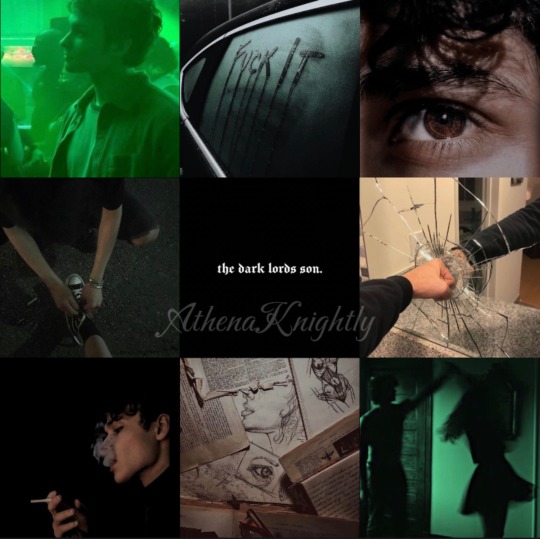
Basics:
Full Name: Mattheo Riddle
Nickname: Matt, Matty
Gender: Male
Date of Birth: 31 December, 1979
Heritage: English
Blood Status: Half- Blood
Wand: Yew, Dragon Heartstring, 13", Flexible
Appearance:
Hair Color: Black
Eye Color: Dark brown, almost black in some lighting
Skin Tone: Fair. Porcelain like
Height: 6'2"
Body Type: Lean, Athletic
Style: Mix of sophisticated and modern comfort. Tailored joggers, designer hoodies, and sleek leather jackets for a look that's both stylish and comfortable. His wardrobe is filled with premium basics like fitted T-shirts, cashmere sweaters, and designer sneakers.
Features: Intense gaze, Chiseled Jawline, Athletic build, Confident demeanor, Dark Aura, Magnetic Charm, Style, Always smoking a cigarette
Personality:
Traits: Ambitious, Intelligence, Charisma, Protective, Independant
Likes: Reading, Hanging out with friends, Causing Mischief,
Dislikes: Incompetence, Weakness, Conformity, Modesty
Hobbies: Quidditch, Dueling, Learning thing outside of the school curriculum, drawing
Fears: His father, Failure, Loss of control, Betrayal
Family and Friends:
Father: Tom Riddle Jr.
Known as Voldemort/ Dark Lord
Imprisoned on maximum security in Azkaban
Mother: Unknown
Was a follower of the Dark Lords
Died in childbirth
Friends: Draco Malfoy, Theodore Nott, Blaise Zabini, Enzo Berkshire
Magic:
Special Abilities: Natural aptitude to the Dark Arts, Parseltongue
Boggart: A dark version of himself
Patronus: Raven
Polyjuice: It might appear as a deep shade of burgundy or midnight blue. It would have a complex taste of rich spices like cinnamon and clove with a bitterness of black coffee
Amortentia: Old books, fresh pine and smoke
Backstory:
Mattheo Riddle was born on a cold winter's night in December 1979, the only child of Tom Riddle Jr., better known as the infamous Dark Lord Voldemort, and an unnamed witch who was a devoted follower of the Dark Arts. Mattheo's mother died in childbirth, leaving him orphaned from the moment he drew his first breath. Raised by other followers of his father, Mattheo grew up surrounded by darkness and secrecy, his childhood steeped in the shadows of his family's dark legacy.
From a young age, Mattheo exhibited a keen intellect and a thirst for knowledge that surpassed his years. Despite his upbringing among dark wizards and witches, he was drawn to the complexities of magic and the mysteries of the wizarding world. He devoured books on ancient spells, studied the intricacies of potion-making, and honed his magical skills with a diligence and determination that belied his tender age.
As Mattheo grew older, he began to chafe against the constraints of his family's legacy, yearning to carve out his own path in the world beyond the shadows of his father's name. When he received his letter to Hogwarts School of Witchcraft and Wizardry at the age of eleven, it was both a moment of triumph and trepidation. He knew that Hogwarts would be his chance to escape the dark influences that had surrounded him since birth, but he also feared the expectations that would follow him wherever he went.
At Hogwarts, Mattheo quickly distinguished himself as a student of exceptional talent and ambition. He excelled in his studies, earning top marks in every subject and mastering spells that left even his professors in awe. He became known for his sharp wit, his confident demeanor, and his ability to effortlessly navigate the complexities of wizarding society. Despite his aloof exterior, he formed close bonds with a select group of friends, including Draco Malfoy, Theodore Nott, Blaise Zabini, and Enzo Berkshire, forming a tight-knit circle that would become the envy of the school.
Outside of the classroom, Mattheo's reputation as a Quidditch prodigy preceded him. He was a natural on the broomstick, with a skill and agility that made him a formidable opponent on the Quidditch pitch. He led the Slytherin Quidditch team to victory after victory, earning accolades and admiration from his peers and cementing his status as one of Hogwarts' most celebrated athletes.
Despite his success and popularity, Mattheo struggled with the weight of his family's legacy and the expectations that came with bearing the name of Voldemort. He grappled with questions of identity and morality, torn between the darkness of his heritage and the light that flickered within him. He yearned to break free from the shadows that had haunted him since birth, but he knew that the legacy of his father would always loom large over his life.
As he approached his final year at Hogwarts, Mattheo stood at a crossroads, torn between the past that defined him and the future that beckoned with promise. With graduation looming on the horizon, he knew that he would soon have to make a choice that would shape the course of his destiny. But for now, he would continue to walk the fine line between light and darkness, navigating the complexities of his heritage with courage and conviction, determined to forge his own path in a world that sought to define him by the sins of his father.
Academics:
Best Subject: DADA
Favorite Subject: Potions
Favorite Professor: Snape
Worst Subject: Muggle Studies
Least Favorite Subject: History of Magic
Least Favorite Professor: Binns
Student Life:
A mix of academic excellence, social prominence, and a constant struggle to define his own identity in the shadow of his father
Stood out as one of the brightest students, excelling and mastering more than just the curriculum
Popular, despite his challenges.
Is at every Slytherin event
Slytherin beater on the Quidditch team
Walks a fine line of light and dark, wrestling with his demons from his past
Is really just a puppy-eyed boy behind his tough exterior

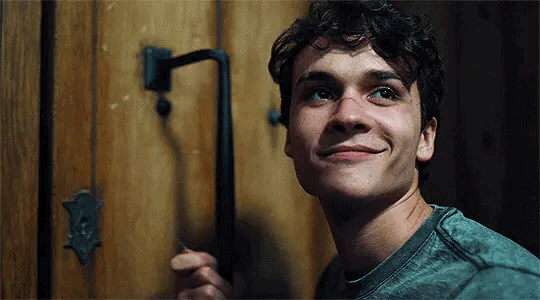

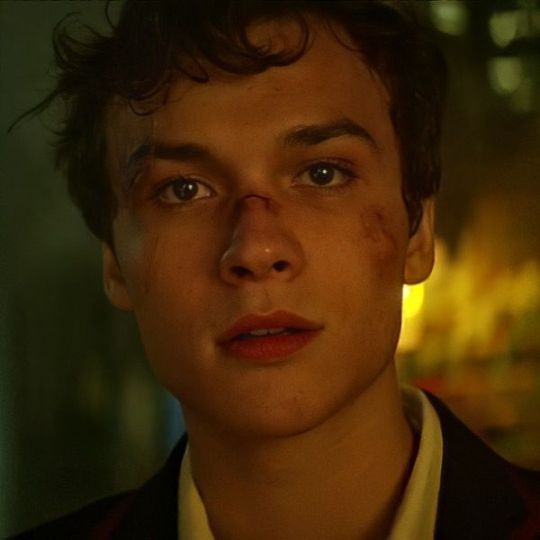
Template: @hazyange1s
#hogwarts school of witchcraft and wizardry#slytherin#hogwarts houses#hogwarts oc#hogwarts#mattheo smut#mattheoxreader#mattheo x you#mattheo riddle#mattheo riddle x reader#mattheo riddle smut#slytherin boys#slytherin boys smut#slytherin boys x reader#voldemort#tom marvolo riddle#tom riddle
265 notes
·
View notes
Text
The world belongs to dreamers
~ Rhysand X Reader
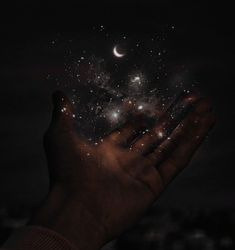


Summary: Whilst struggling to cope with the loss of his mother and sister, you show Rhysand what it means to dream once more.
Warnings: Serious angst (loss of family) but a fluffy/hopeful ending?
“There you are, I’ve been looking for you.”
You spoke the words softly, afraid to startle the young High Lord as you slowly approached him from behind. Rhysand providing you with no sign of acknowledgement as you came to sit beside him on the roof of the Town House.
Rather, the males expression remained as cold as stone. His empty violet eyes free from the shackles of human emotion as Rhysand icily stared off into the vast oblivion of the night sky.
You were sat beside a broken man.
One who had lost everything; everyone. He was a male who had nothing left to live for and yet that was exactly what was expected of him - to continue living. The sweet kiss of death being a mercy that Rhysand would not be allowed to receive, not whilst he had his duty to the court.
It was impossible to know what to say in the face of grief and you were certain that whatever meagre words of comfort you could provide Rhysand would fall deaf upon his ears. Besides, what was there to say that hadn’t already been spoken?
And so you offered him the only thing you could think of; your company. A silent companion in Rhysand's time of need. You wouldn't allow yourself to be the one to lure him into a false state of happiness with empty hope and useless reassurances. You would be a grounding presence, an open ear. Silently shouldering your friend’s burden to help carry the weight of his sorrows alongside him.
It took an hour for Rhysand to notice you, a seconds glance in your direction accompanied by grunt of acknowledgement before he cast his chilling gaze back to the stars. Then another hour of silence was needed before he could find the words to speak to you and when he finally did, it was difficult to ignore the way your heart shattered at the rawness of his vulnerability.
"They're really gone, aren't they?"
It was a question with only one answer, yet it was one you couldn't speak. Rhysand needn't hear the truth because he had already seen it. Your friend having witnessed the unthinkable, having seen things that no son - no brother - should ever have to see.
Rhysand's brows knitted together at your failure to answer him, turning his violet eyes back to the stars in defeat. A low growl rumbling in his chest as he finally allowed his festering anger to consume him, the darkness which plagued his splintered soul breaking free from its constraints.
"It should have been me" he hissed, a bitter mask of fury marring his handsome features. Rhysand's usually bright eyes now dark and unforgiving. Despite the fact his wings were hidden, you didn’t fail to notice the daunting presence of shadows which commanded your attention in their absence.
All you could do was helplessly shake your head in disagreement, tears beginning to sting your eyes as you pathetically replied, "You don't mean that Rhys, not really."
An empty laugh escaped from his lips, the rolling of his eyes a stab to your heart as he retorted, "My mother is dead. My sister is dead. My Father. . . Are you going to stand there idly and foolishly believe that everything is ok? There's nothing left for me now but ruins. I have no one.”
“You have me” you answer, pained eyes meeting Rhysand’s own lost ones, a hurt whimper leaving your mouth before you continued, “And Cassian, Azriel, Mor. Rhys you’re never alone, not as long as you have us.”
His shaky sigh and wavering shadows gave you the confidence to continue, “This isn’t what she’d want Rhys. What they’d want. Feel, allow yourself that. But don’t allow your emotions to destroy you.”
The violet glow began to return to his eyes, the anger now seeping away as a heart wrenching wave of devastation took its place.
Rhysand’s hollow voice replied, “But we’ll never know what she wanted because of him. We’ll never know what she could have become or what she might have offered the world. Every night I look to the stars and all I can think is that it’s a sight she will never be able to see again, all because it was stolen from her, and it’s not fair.”
“It never is” you comfort, coming to rest a soothing hand on the males shoulder causing his rising tide of shadows to finally dissipate, “Rhys she needn’t look to the stars anymore because she is one. They’re up there, your family, watching over you, all you have to do is look up.”
“And what if they don’t like what they see. What if they look down and only see the broken High Lord and his broken court” Rhysand consciously asked, spitting the cursed words out as he cast his eyes to the glowing city before him.
“Is that what you see?” You questioned, wondering how Rhysand could look down upon the illuminated streets and see anything but hope, “a broken court?”
“All that’s left after the war are crumbling foundations and hollow people” he bitterly scoffed, failing to see the embers which still remained.
“Foundations can be rebuilt. . . Rhys I look at you and I fail to see how our future could be anything other than bright. Build a court of dreamers Rhys, build it from hope.” You encouraged, fighting the desire to drop to your knees and beg for the future you knew only the male had the power to deliver.
“I don’t think I know how to dream anymore” he quietly spoke, words releasing as a whisper, Rhysand afraid that his lack of dreaming made him unworthy of being your High Lord.
“You really see no future for your court?” You ask, probing eyes searching his thoughtful expression for answers.
“I used to. . . Before all this. But I’ve never had to dream of a future without my sister” he gulped, pearlescent tears beginning to run down his gaunt cheeks.
You lifted a comforting hand, gentle thumbs working to brush away each tear as they came, a sad smile taking its place on your lips as you spoke, “You really think she won’t be there Rhys? Your family will never leave you, they’ll always be right here,” your hand moves to rest against his chest, delicate fingers pressing right above the steady beating of his heart, “carry them with you and they’ll never be far away.”
“And the dreams?” He presses, seeking more reassurance from you, “when will they return?”
“You never stop dreaming Rhys, not whilst there’s still hope. . . Take a breath” you order, entwining both your hands with his own as Rhysand did as you asked and drew in a deep breath, “Then just close your eyes and dream.”
“Dream? Just like that?” He nervously queries, not quite believing in your unusual methods, yet fearing he’d break the spell by opening his eyes.
“Think of everything you’ve ever wanted to change about this court, about your life. Every stupid rule you’ve never liked, every choice of your fathers you’ve disagreed with. The world is yours to mould now, every wish, every dream, they’re yours to chase after. Dreams are the foundations for our future Rhys, you just have to have the courage to make them a reality. All you have to do is believe in yourself.”
“And do you?” Rhysand asked, opening his calm violet eyes to look deeply into your own, “. . . Believe in me.”
“The world is full of dreamers Rhys, but there's only one I’d choose to follow" you answer honestly, your reply bringing a small smile to the new High Lord's lips.
"And if I tell you I dream of building this future together, what then?" he asks hopefully, his steady gaze overflowing with anticipation of your response.
"Then who am I to deny you of your wishes? You just let me know when you're ready to start."
You grin at the familiar face smiling back at you, the face of your High Lord, of your friend. Failing to quell the fluttering which grew in your stomach as Rhysand answered you, "I think we've already started Darling, my first dream just came true."
~~~~~~~~~~~~~~~~~~~~~~~~~~~~~~~~~~~~~~~~~~~~~
Notes: Every time I write Rhysand I always say it’s going to be smut next and it’s always angst… anyways, smut next time?
Big thank you to @illyrianbitch and @sarawritestories for their help with this one, they saved me from describing Rhysand’s eyes like aubergines 😬
#acotar#fanfic#acotar imagine#sarah j maas#a court of thorns and roses#rhysand angst#rhysand x reader#rhysand imagine#rhysand fanfic#rhysand acotar#rhysand
217 notes
·
View notes
Text
i cannot say if wildbow did it on purpose but a child regarded as innately evil removed from her parent through force and adopted into a white family with the express purpose of exploiting her power and removing the villian influence ("civilizing" her) while resenting her for her origins and her failure to achieve their ideas of whiteness, othering her to the point she cannot see them as family or develop any healthy connections, then treating her as an infection of their ideal family that corrupts the perfect white american ideal glory girl stands for is an incredibly racially coded arc. Treating amy as a disease is racist and homophobic. you can't just decide there is no racial implications. the tragedy of the dallon sisters is a direct result of the new wave's distinctly white nuclear family and there was never going to be a way for them to survive within its constraints
361 notes
·
View notes